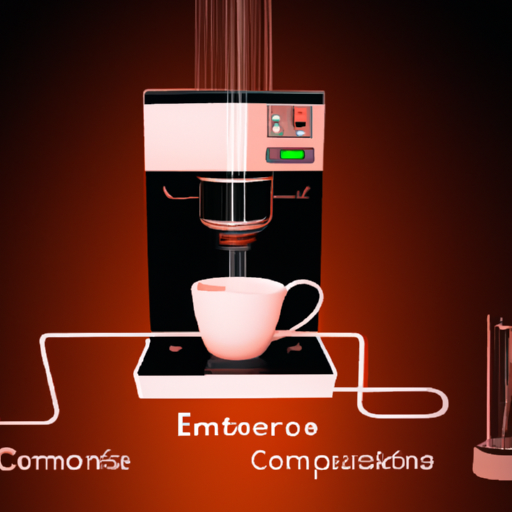If you’re a coffee enthusiast who also cares about the environment, you may have wondered if there are eco-friendly coffee makers available. Well, good news! In this article, we’ll explore the world of eco-conscious coffee makers and highlight some sustainable options that not only brew a great cup of joe but also minimize their impact on the planet. So grab your favorite mug and get ready to discover how you can enjoy your daily dose of caffeine while being kind to Mother Earth.
Types of Coffee Makers
Drip coffee makers
Drip coffee makers are the most common type of coffee makers found in homes and offices. They work by pouring hot water over ground coffee beans contained in a filter. The water drips through the coffee grounds, extracting the flavor and resulting in a full-bodied cup of coffee. Drip coffee makers are typically easy to use and can brew a large quantity of coffee at once, making them a popular choice for those who need to make coffee for a group of people.
Single-serve coffee makers
Single-serve coffee makers, also known as pod coffee makers, have gained popularity in recent years. These machines use pre-packaged coffee pods that are inserted into the machine, which then brews a single cup of coffee. Single-serve coffee makers are convenient and eliminate the need for measuring and grinding coffee beans. However, the pods used in these machines can contribute to waste generation, making them less eco-friendly compared to other coffee maker options.
Espresso machines
Espresso machines are designed to brew small but highly concentrated shots of coffee known as espresso. These machines use pressurized water and finely ground coffee to create a rich and bold flavor. Espresso machines come in various types, including manual, semi-automatic, and fully automatic. While espresso machines offer a unique coffee experience, they typically consume more energy and require more maintenance compared to other types of coffee makers.
French press
French press coffee makers have a simple and elegant design. They consist of a glass or metal container with a plunger and mesh filter. To brew coffee using a French press, you add coarsely ground coffee to the container, pour hot water over it, and let it steep for a few minutes. Afterward, you press the plunger down to separate the coffee grounds from the brewed coffee. French press coffee makers are preferred by many coffee enthusiasts who enjoy the full-bodied and flavorful coffee they produce.
Cold brew makers
Cold brew coffee makers are specifically designed for making cold brew coffee, a popular alternative to regular hot brewed coffee. These machines use a slower and gentler brewing process, which involves steeping coarsely ground coffee in cold water for an extended period of time, usually overnight. The result is a smoother, less acidic coffee beverage. Cold brew makers often have a larger capacity and can produce a concentrate that can be diluted or consumed as is.
Environmental Impact of Coffee Makers
Energy consumption
One of the main environmental considerations when choosing a coffee maker is its energy consumption. Coffee makers that use heating elements, such as drip coffee makers and espresso machines, can consume a significant amount of energy during the brewing process. Look for coffee makers with energy-efficient features, such as automatic shutoff and adjustable temperature settings, to minimize energy usage.
Water usage
Coffee production and brewing require a substantial amount of water. Traditional coffee makers, such as drip coffee makers, can consume a significant amount of water with each brew. Single-serve coffee makers and espresso machines, on the other hand, often use less water per cup. Consider the water efficiency of a coffee maker, especially if you live in an area with water scarcity or want to reduce your overall water consumption.
Waste generation
The coffee brewing process can generate waste in various forms, including coffee grounds, paper filters, and coffee pods. Traditional coffee makers that use paper filters produce waste every time you brew coffee, whereas single-serve coffee makers generate waste in the form of used pods. Opt for coffee makers that allow you to use reusable filters or compostable coffee pods to minimize your waste generation.
Packaging materials
When purchasing coffee makers, be mindful of the packaging materials they come in. Look for coffee makers that use minimal packaging and opt for brands that prioritize sustainable and recyclable materials. Additionally, consider the environmental impact of the coffee pods or capsules used by certain coffee makers. Many brands now offer recyclable or biodegradable options for their pods, reducing the overall environmental impact.
Features to Look for in an Eco-friendly Coffee Maker
Energy-efficient
To decrease the energy consumption of your coffee maker, look for models with energy-efficient features. Automatic shutoff is a key feature to consider as it turns the machine off after a certain period of inactivity. Additionally, some coffee makers have adjustable temperature settings, allowing you to lower the temperature and conserve energy without compromising the quality of your coffee.
BPA-free materials
Bisphenol A (BPA) is a chemical commonly found in plastic materials. It is known to have potential health risks and can leach into beverages, including coffee. To ensure your coffee is free from harmful chemicals, choose coffee makers that are made from BPA-free materials. Many manufacturers now offer BPA-free options, providing a safer choice for coffee lovers.
Reusable filters
Using reusable filters instead of disposable paper filters can significantly reduce waste generation from your coffee routine. Look for coffee makers that come with reusable filters or are compatible with reusable filter options. These filters are typically made from stainless steel or other durable materials and can be easily cleaned and reused, saving both money and the environment.
Programmable settings
Coffee makers with programmable settings allow you to set a brewing time in advance. This feature enables you to wake up to a freshly brewed cup of coffee without having to wait for the machine to brew. By brewing coffee during off-peak energy hours, you can take advantage of lower electricity costs and reduce the strain on the power grid.
Water-saving features
Conserving water is essential for reducing the environmental impact of your coffee routine. Look for coffee makers that offer water-saving features, such as adjustable brew sizes or water flow control. These features allow you to customize the amount of water used for each cup of coffee, reducing water waste.
Certifications for Eco-friendly Coffee Makers
Energy Star
The Energy Star certification is awarded to appliances that meet strict energy efficiency criteria set by the U.S. Environmental Protection Agency (EPA). Coffee makers with the Energy Star label are designed to be more energy-efficient, helping you minimize your carbon footprint and save on energy costs.
CAFÉ Standards
The Corporate Average Fuel Economy (CAFÉ) Standards set fuel efficiency requirements for vehicles, including coffee makers. Coffee makers that meet these standards are designed to use less energy during the brewing process, contributing to reduced greenhouse gas emissions.
USDA Organic
The USDA Organic certification ensures that coffee makers meet specific standards for organic production. Coffee makers with this certification are made with materials that are free from synthetic pesticides, chemicals, and genetically modified organisms (GMOs). By choosing USDA Organic certified coffee makers, you support environmentally-friendly farming practices and reduce exposure to potentially harmful substances.
Fair Trade Certified
The Fair Trade Certified label guarantees that coffee makers have been produced and traded in accordance with fair labor and environmental standards. This certification ensures that farmers and workers involved in the coffee production process are paid fair wages and work in safe conditions. By purchasing Fair Trade Certified coffee makers, you support ethical and sustainable coffee production.
Brands with Eco-friendly Coffee Makers
Breville
Breville is a renowned brand that offers a range of eco-friendly coffee machines. Their coffee makers are often equipped with energy-saving features, such as adjustable temperature and automatic shutoff. Breville also offers models with reusable filters and programmable settings, allowing you to customize your brewing experience while minimizing environmental impact.
Keurig
Keurig has made significant strides in improving the sustainability of their coffee makers. They now offer recyclable K-Cup pods and reusable My K-Cup filters, reducing waste generation. Keurig also partners with coffee suppliers who follow ethical and sustainable practices, providing a wide selection of Fair Trade Certified and USDA Organic options.
Nespresso
Nespresso is committed to sustainability and has implemented several initiatives to reduce the environmental impact of their coffee makers. They have developed a recycling program for their aluminum coffee capsules and offer a range of certified compostable capsules. Nespresso also collaborates with coffee farmers to promote sustainable farming practices and support local communities.
Cuisinart
Cuisinart offers a variety of coffee makers with eco-friendly features. Their models often come with reusable filters and programmable settings, enabling you to reduce waste and conserve energy. Cuisinart also focuses on durability and longevity in their products, reducing the need for frequent replacements and minimizing overall environmental impact.
Making your Coffee Routine More Sustainable
Buy Fair Trade and Organic beans
When purchasing coffee beans, opt for Fair Trade Certified and USDA Organic options. Fair Trade Certified coffee ensures that the farmers receive fair wages for their work and that environmental standards are met. USDA Organic certified coffee beans are grown without the use of synthetic pesticides or genetically modified organisms. By supporting these sustainable practices, you contribute to a more environmentally friendly coffee industry.
Use a reusable coffee cup
Using a reusable coffee cup instead of disposable cups is a simple way to reduce waste. Look for reusable cups made from materials like stainless steel or glass, and ensure they are BPA-free. Many coffee shops now offer discounts or incentives for customers who bring their own cups, making it both an environmentally conscious and cost-effective choice.
Compost coffee grounds
Coffee grounds can be a valuable resource for composting. Instead of tossing them in the trash, collect your used coffee grounds and add them to your compost pile. Coffee grounds are rich in organic matter and nitrogen, making them an excellent addition to compost that enriches the soil. By composting coffee grounds, you divert waste from landfills and contribute to healthier, more sustainable gardening practices.
Support local coffee shops
Opting for local, independent coffee shops can have a positive impact on the environment. Local coffee shops often prioritize sustainable practices, such as sourcing coffee beans from local farmers and using eco-friendly packaging. Additionally, supporting local businesses helps reduce the carbon footprint associated with transportation and packaging materials often found in larger chain coffee shops.
In conclusion, eco-friendly coffee makers are indeed available, offering a range of features and certifications that help minimize the environmental impact of your coffee routine. By choosing coffee makers that are energy-efficient, use BPA-free materials, offer reusable filters, and have water-saving features, you can make a conscious effort to reduce your carbon footprint. Additionally, supporting brands that prioritize sustainability and certifications such as Energy Star, CAFÉ Standards, USDA Organic, and Fair Trade Certified ensures you’re making a positive impact in the coffee industry. Making sustainable choices, such as buying Fair Trade and Organic beans, using reusable coffee cups, composting coffee grounds, and supporting local coffee shops, further enhances the eco-friendliness of your coffee routine. Remember, small changes in your coffee habits can make a big difference in protecting the planet for future generations.




